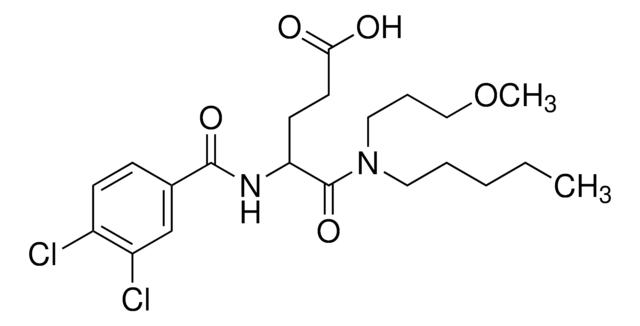L109
Lorglumide sodium salt
solid
Synonyme(s) :
(±)-4-[(3,4-Dichlorobenzoyl)amino]-5-(dipentylamino)-5-oxopentanoic acid sodium salt, CR 1409
About This Item
Produits recommandés
Forme
solid
Niveau de qualité
Couleur
white
Solubilité
45% (w/v) aq 2-hydroxypropyl-β-cyclodextrin: >10 mg/mL
H2O: 10 mg/mL
methanol: 28 mg/mL
Chaîne SMILES
[Na+].CCCCCN(CCCCC)C(=O)C(CCC([O-])=O)NC(=O)c1ccc(Cl)c(Cl)c1
InChI
1S/C22H32Cl2N2O4.Na/c1-3-5-7-13-26(14-8-6-4-2)22(30)19(11-12-20(27)28)25-21(29)16-9-10-17(23)18(24)15-16;/h9-10,15,19H,3-8,11-14H2,1-2H3,(H,25,29)(H,27,28);/q;+1/p-1
Clé InChI
JCNPYMDDOUQTBK-UHFFFAOYSA-M
Informations sur le gène
human ... CCKAR(886)
Application
Actions biochimiques/physiologiques
Code de la classe de stockage
11 - Combustible Solids
Classe de danger pour l'eau (WGK)
WGK 2
Point d'éclair (°F)
Not applicable
Point d'éclair (°C)
Not applicable
Équipement de protection individuelle
Eyeshields, Gloves, type N95 (US)
Faites votre choix parmi les versions les plus récentes :
Déjà en possession de ce produit ?
Retrouvez la documentation relative aux produits que vous avez récemment achetés dans la Bibliothèque de documents.
Notre équipe de scientifiques dispose d'une expérience dans tous les secteurs de la recherche, notamment en sciences de la vie, science des matériaux, synthèse chimique, chromatographie, analyse et dans de nombreux autres domaines..
Contacter notre Service technique![(Tyr[SO3H]27)Cholecystokinin fragment 26-33 Amide ≥97% (HPLC), powder](/deepweb/assets/sigmaaldrich/product/structures/125/021/32eb71ec-73e5-4cfc-94d0-ebcf5e784e39/640/32eb71ec-73e5-4cfc-94d0-ebcf5e784e39.png)








